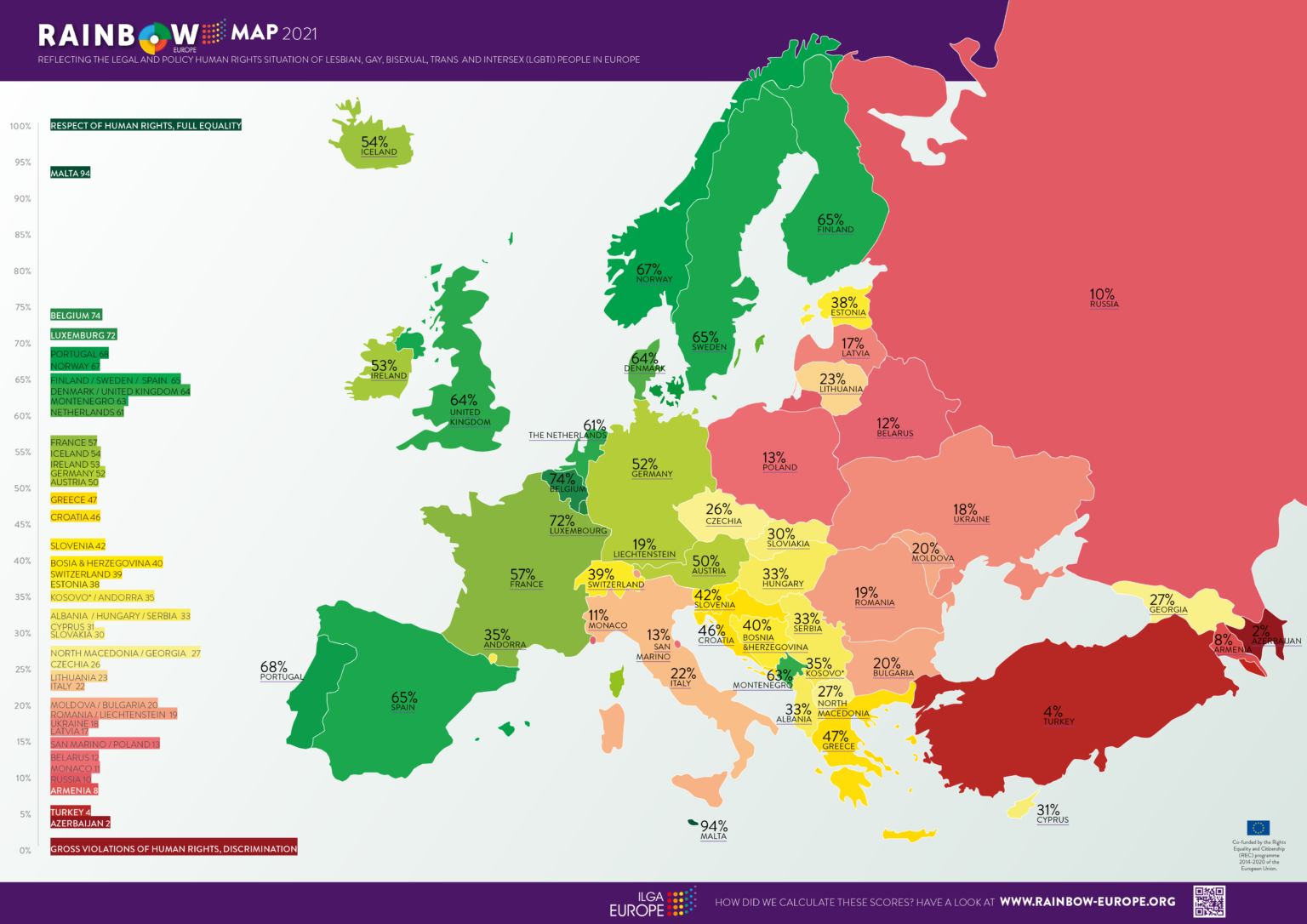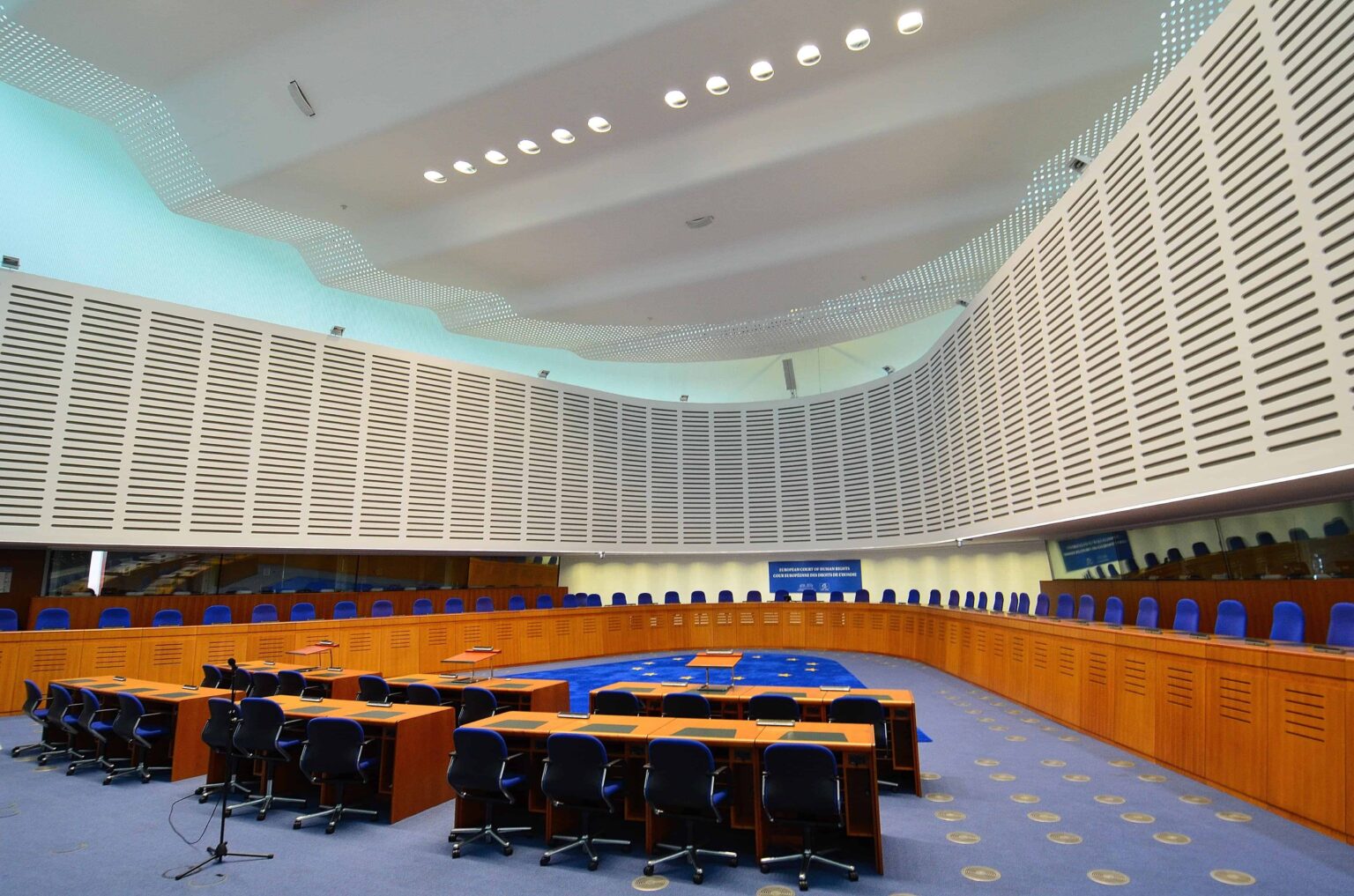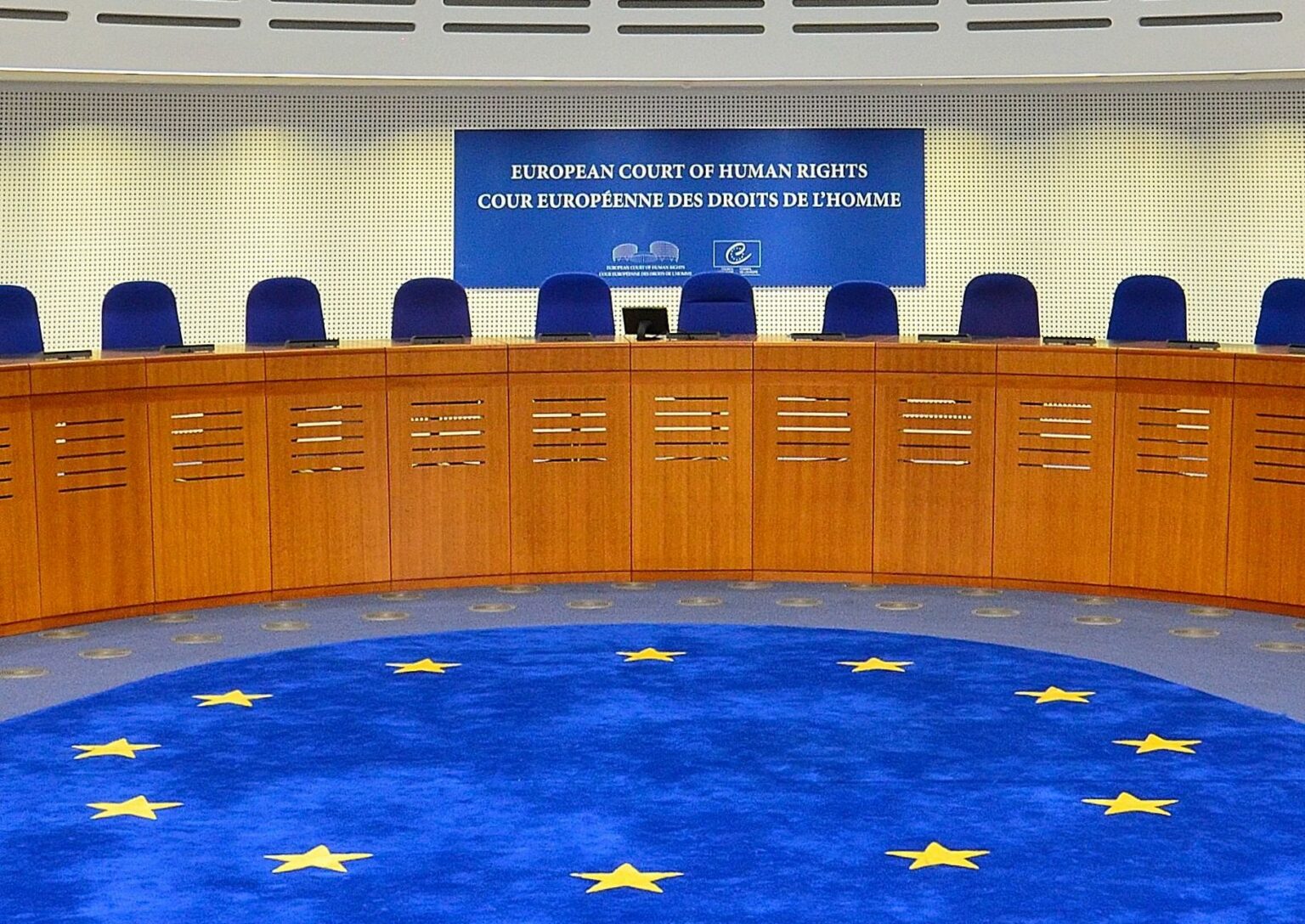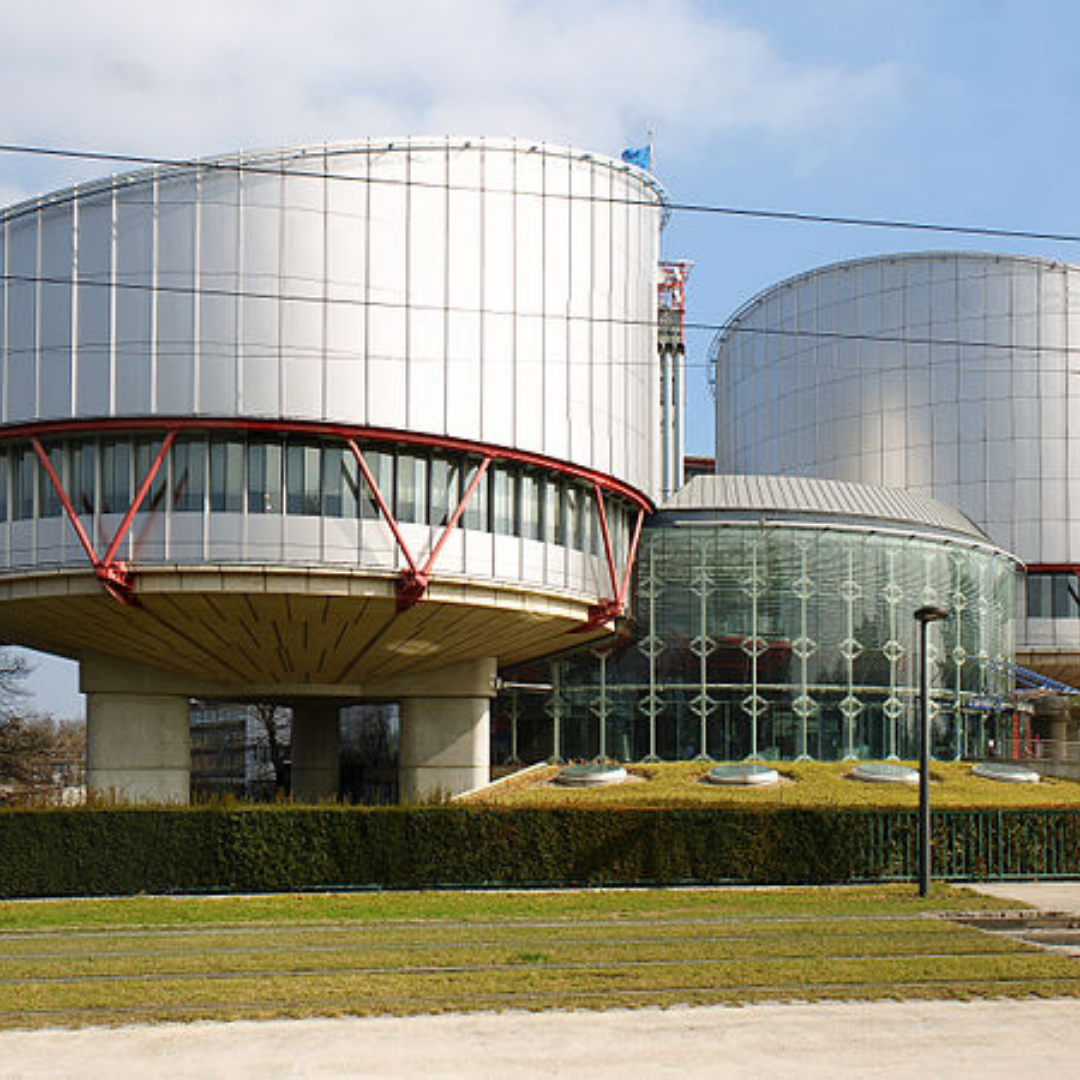Sexual orientation is not a reason to terminate a contract with a self-employed worker, says Advocate General of the CJEU

Today, the Advocate General of the CJEU has issued an opinion in the case of J.K. vs the Polish public broadcaster company TP, stating that discrimination based on sexual orientation in employment is not acceptable under EU law.
ILGA-Europe welcomes the Advocate General of the Court of Justice of the European Union’s (CJEU) opinion, published today in the case C-356/21, concerning the refusal to continue a contract of work with a self-employed person on the basis of that person’s sexual orientation violates EU law.
The applicant, J.K., is seeking compensation from the Polish public broadcaster TP for the breach of the principle of equal treatment on the grounds of sexual orientation in the form of direct discrimination in the context of the employment relationship between the two parties. J.K is openly a member of LGBTI community, and together with his partner, he engages in the activism for LGBTIQ+ rights, including running a popular YouTube Channel.
The Defendant is the Polish public broadcaster TP, a nationwide public TV network fully owned by the State Treasury. During 2010 – 2017, the employment relationship between the Applicant and the Defendant was based on regularly concluded, consecutive short-term contracts for specific work.
In December 2017, the Applicant and his partner released a Christmas video on their YouTube Channel, where they appeared among other members of the LGBTIQ+ community. Two days after the video was posted, the Applicant received an e-mail from his immediate supervisor cancelling his scheduled shifts. He was also informed that the Defendant was not planning to cooperate with the Applicant any longer. He was replaced by another employee, who had neither the qualifications nor the experience to perform the tasks previously performed by the Applicant.
In her opinion the Advocate General firstly confirmed that self-employment is covered under the Directive and by covering the area of ‘employment and occupation’, the “Directive aims at enabling citizens to realise their potential and earn their living by providing their work”. Furthermore, in addressing the issue concerning “conditions for access to self-employment”, the AG suggests that the Directive covers both initial stage of concluding a contract, but also the provision relating to the termination of contractual relationship. At all stages, discrimination based on sexual orientation is not acceptable.
According to Arpi Avetisyan, Head of Litigation with ILGA-Europe: “Advocate General Capeta’s opinion is a welcome confirmation that discrimination based on sexual orientation has no place under the EU Directive, including for self-employed workers. We hope the Court will follow the Advocate General’s opinion and build on it so that EU law in this area protects self-employed workers ensuring equal access to employment. Freedom to choose a contracting party does not imply freedom to discriminate.”
Where are my rights? These essential maps chart the recognition of LGBTI people across the globe

Every year, ILGA-Europe publishes our Rainbow Map, charting LGBTI rights in 49 European countries. But we’re not the only benchmarking map on the scene. From sexual orientation laws in the world to inclusive churches in Europe, these charts depict the state of LGBTI rights and more across the world.
If you are reading this blog, you may be familiar with ILGA-Europe’s Rainbow Map. Published every May, our Rainbow Europe Map and Index illustrates the legal and policy situation of LGBTI people in 49 European countries. It’s a benchmarking tool that has been consistently tracking the development , both positive and negative, of LGBTI rights over the past 12 years.
This year, our map revealed a widespread and almost complete stagnation on human rights of LGBTI people, marking an unprecedented year in its history, with almost no positive legislative change for LGBTI people in Europe. However, the map pointed towards a gap in the clouds. We are at a juncture when governments can actively choose the right way forward. At least 15 countries have plans and policy discussions already on the table, and therefore the map could look positively different next year.
While we endeavour to chart the legal and policy situation for LGBTI people in Europe with the Rainbow Map, one benchmarking map cannot not cover all aspects of LGBTI rights. Take a look at these LGBTI maps developed by other organisations.
TGEU’s Trans Rights Map
In their map, Transgender Europe illustrate the legal rights of trans people in 54 countries in Europe and Central Asia. This year, the organisation documented an alarming decline in trans rights, as progressive countries have slowed down in increasing protections, while moderate countries have often stalled progress altogether, and a growing number of countries are removing rights from trans people.
Legal Gender Recognition — Mental Health Diagnosis
Legal Gender Recognition — Sterilisation
Asylum
Protection against hate
Non-Discrimination
OII-Europe Intersex Good Practice Map
OII-Europe’s map features nine examples of good practices from the areas of policy action, data collection, monitoring, legal gender recognition, campaigning, anti-discrimination, legislation against hate speech/crime, and funding training and counselling. Check them out here!
ILGA World’s Sexual Orientation Laws Map
Every year, along with its State-Sponsored Homophobia report, ILGA World publishes maps of sexual orientation laws in the world. A useful tool for LGB human rights defenders, these maps expose the arbitrariness of persecutory laws, and starkly indicate the absence of positive law in most parts of the world.
Rainbow Index of Churches in Europe
The European Forum of LGBT Christian Groups and the Protestant Theological University in the Netherlands have collected and analysed data on the official position of churches in Europe on their national levels. You can navigate their map rating the inclusivity of churches by country in regard to LGBTI people.Report on inclusivity of Churches towards LGBTI personsReport commissioned by the European Forum of LGBT Christian Groups and produced by the Protestant Theological…inclusive-churches.eu
Voices of ILGA-Europe: Meet Italian legal eagle, Emiliano Ganzarolli

The Court of Justice of the European Union has just made a landmark decision, saying that a lawyer who declared that he would never hire a “homosexual” person in his law firm was discriminating under an EU employment directive. Meet activist Emiliano Ganzarolli, from the powerhouse group of LGBT lawyers who took the case.
Emiliano Ganzarolli is a member of Rete Lenford Avvocatura Per I Diritti LGBT (Lawyers For LGBT Rights) an association of about 150 lawyers founded in 2007 to take representative action on the behalf of LGBT people before national and international jurisdictions, and to ensure enforcement of LGBT rights in Italy.
The association has notably been active in the fight for marriage equality, and the implementation of a civil partnership framework for same-sex couples.
“In 2007 there was nothing in the Italian law concerning either civil unions or marriage and the association itself was actually founded because of this lack in our system,” says Emiliano in an interview filmed for the Voices of ILGA-Europe project last October. “It brought together lawyers and activists from the civil society to bring cases up to the constitutional level. In 2010 the constitutional court was asked to deliver a judgement on the possibility or not to have equal marriage in Italy. The case was not successful, we still don’t have equal marriage in Italy, but that was the beginning of many battles the association took.”
Recently, the Association was involved with the first case in Italy involving discrimination in an employment context, after an attorney declared during a radio interview that he would never hire a homosexual person in his law firm.
The case was brought in front of a tribunal in the Court of Appeal by Rete Lenford. “It was successful in the first instance, and the second, and then the case was appealed in front of the Supreme Court in Italy,” Emiliano explains. “The Supreme Court referred the case to the Court of Justice of the European Union (CJEU).
“When we received the communication that the Supreme Court had referred the case to the CJEU, it was the immediate reasoning to involve an umbrella association, somebody able to actually properly talk at the same level with the European institutions. So it came naturally to involve ILGA-Europe in this. ILGA-Europe’s litigation department has been extremely supportive, especially putting us in contact with the other EU countries.”
Two distinct questions arose before the Italian Supreme Court: Firstly, does legislation prohibiting discrimination in access to employment also cover a general statement made on the radio to the effect that the interviewee would not recruit homosexuals to his law firm? Secondly, in the absence of an identifiable victim, is it possible for Rete Lenford to seek to enforce the prohibition of discrimination in employment and occupation, including through the award of damages?
In a judgement delivered on 23 April 2020, the CJEU decided on behalf of Rete Lenford. Importantly the Court noted that the lawyer’s statements may fall within the ambit of the European Union anti-discrimination directive, even if no recruitment procedure had been opened or planned at the time when the statements were made.
Because discriminatory statements can have a chilling effect on prospective employees, therefore difficult to have an identifiable victim, the Court noted that where national law provides relevant conditions, an association, as in this case Rete Lenford, may bring legal proceedings for a finding of discrimination and for a sanction to be imposed.
Welcoming the judgement, Senior Litigation Officer with ILGA-Europe Arpi Avetisyan said: “I’m extremely pleased that CJEU reaffirmed protection against homophobia in employment and made clear that discriminatory statements in employment and occupation under the EU law are strictly prohibited. The Court sent a strong message that EU law does not tolerate discrimination based on sexual orientation and safeguards “the principle of equal treatment in employment and occupation, and the attainment of a high level of employment and social protection”. Congratulations to Rete Lenford on the victory and for setting an important milestone in clarification of EU law.”
X. v Poland

Custody rights
(Application no. 20741/10), 19 July 2019
Find here the communicated case.
- Following a divorce, a mother was denied custody of her three children on grounds of her sexual orientation.
- ILGA-Europe together with FIDH, ICJ, KPH and NELFA submitted the following:
- The ECtHR expressly stated that the concept of one’s sexual orientation is a prohibited ground of discrimination under Article 14 ECHR and discrimination on this ground is considered ‘suspect’ and subject to ‘particularly severe scrutiny’. The Court has confirmed that parent-child ties and custody cases fall under Article 8, and applies to LGBTI parents’. In Salgueiro da Silva Mouta v. Portugal, the ECtHR considered that the refusal to grand custody over the child based on the applicant’s sexual orientation constituted a violation of Article 8 in conjunction with Article 14. The IACtHR reached the same conclusion in Atala Riffo y Ninas v Chile, where custody rights were denied to the mother due to her sexual orientation. A number of national courts in Europe and internationally have considered the custodial rights of gay and lesbian parents, affirming their right to equal access to children without discrimination based on sexual orientation.
- This case provides the Court with the opportunity to reaffirm its findings made in Salgueiro da Silva Mouta v. Portugal and confirm rights of parents irrespective of their sexual orientation or gender identity and expression to equal access to custody of their children.
O.S. v Switzerland

Asylum/ arbitrary refoulement
(Application no. 43987/16), 24 July 2017
Find Court’s communication here.
- The applicant complained under Article 3 of the European Convention about his impending expulsion to Gambia. He feared that, owing to his homosexuality, even a temporary return to Gambia would expose him to a real risk of arbitrary detention, imprisonment and torture.
- ILGA-Europe together with the AIRE Centre, the ECRE and the ICJ submitted that:
- Concealment is probative of a subjective fear of persecution and constitutes evidence of the objective well-foundedness of that subjective fear . Mental harm resulting from fear of exposure to physical harm has been found by the ECtHR to constitute cruel, inhuman and degrading treatment. Enforcing removals on the basis that the individuals concerned would be expected to conceal their sexual orientation would constitute arbitrary refoulement and thus violate Article 3.
- In Gambia, consensual same-sex sexual activity, can give rise to a number of very serious criminal offences, with penalties ranging from seven years to imprisonment for life. In turn, the criminalization of consensual same-sex sexual relations fosters a climate of state-sanctioned homophobia, resulting in abuse, discrimination and violence by state and non-state actors. The mere existence of laws that criminalize consensual same-sex sexual conduct enables, encourages and contributes to the persecutory environment that exists in Gambia and exposes LGBT individuals to real risks of persecutory harm.
M.T. v. France

Refusal to grant asylum/ Risk of persecution based on sexual orientation
(Application No. 61145/16), 6 July 2017
Find Court’s communication here in French.
Find Court’s decision here in French.
- The applicant, gay asylum seeker from Cameroon, claimed he would face a real risk of treatment contrary to Article 3 because of his sexual orientation if he were deported back to Cameroon.
- Professor Robert Wintemute (School of Law, King’s College London) submitted the following on behalf of ILGA-Europe, FIDH, LDH and ECSOL :
- There is a strong consensus in European and other democratic societies supporting asylum claims by LGBTI persons. The assessment of the risk must take into account the likelihood that an openly LGBTI person would suffer treatment violating Article 2 or 3. An LGBTI person cannot be expected to conceal their sexual orientation or gender identity in their country of origin to reduce the risk of treatment violating Article 2 or 3.
- Apart from any risk of violence, the Court should consider a real risk of imprisonment for private, consensual, adult, same-sex sexual activity (as in Cameroon) as a real risk of inhuman or degrading treatment violating Article 3.
O.M. v. Hungary

Arbitrary detention
(Application no. 9912/15), 21 October 2015
Find Court’s communication here.
- The case concerned immigration detention of a gay asylum seeker from Iran for nearly two months before granting refugee status in Hungary. The applicant complained that his asylum detention was not lawful or justified. It was arbitrary, because the court ordered it without properly analysing the legal grounds, his personal circumstances or the applicability of less stringent measures.
- ILGA-Europe together with the AIRE Centre, the ECRE and the ICJ submitted that:
- The Contracting Parties have an obligation under the Convention to take account of the particular risks that the detention of asylum-seekers entails, including, in particular, when deciding to detain those asylum-seekers who might have been exposed to abuse and/or may risk violence and discrimination on account of their sexual orientation while in detention.
- The interveners stressed the relevance of the EU asylum acquis, the EU Charter of Fundamental Rights and the 1951 UN Convention relating to the Status of Refugees, as amended by its 1967 Protocol, 2 to the determination of the scope and content of Contracting Parties’ obligations under Art 5(1) of the European Convention on Human Rights
- The European Court of Human Rights delivered its judgement on 5 July 2016.
- The Court held that the applicant’s detention verged on arbitrariness and did not contain any adequate reflection on his individual circumstances as a member of a vulnerable group by virtue of belonging to a sexual minority in Iran. Consequently the Court found a violation of Article 5 § 1 of the Convention.
DK v. Croatia

Ill-treatment by police officers
(Application no. 28416/14), 8 June 2015
Find Court’s communication here.
Find Court’s decision here. (Inadmissible, premature complaint before the Court)
- The case concerned police ill-treatment and discrimination based on applicant’s sexual orientation, with subsequent lack of an effective investigation by the Croatian authorities in that respect.
- The joint intervention by ILGA-Europe, the AIRE Centre and the ICJ focusedon the positive obligations of the Contracting Parties under the Convention in respect of allegations disclosing credible evidence of treatment prohibited under Article 3, sexual orientation and/or gender identity as a ground of discrimination, and the duty of the authorities to take all reasonable steps to identify any discriminatory motive in connection with allegations of ill-treatment.
- Submissions further argued that discrimination based on sexual orientation is prohibited on the international and European levels. The ECtHR expressly stated that the concept of one’s sexual orientation is a prohibited ground of discrimination under Article 14 ECHR and discrimination on this ground is considered ‘suspect’ and subject to ‘particularly severe scrutiny’.
Sabalic v Croatia

Physical violence on ground of sexual orientation.
(Application no. 50231/13), 9 May 2014
Find Court’s communication here.
- The applicant complained of the lack of an appropriate procedural response of the Croatian authorities to an act of violence by a private party motivated by her sexual orientation.
- ILGA-Europe together with the AIRE Centre and the ICJ provided an overview of the prevalence and nature of homophobic and transphobic hate crimes in Council of Europe member states. They presented a survey of international, EU and comparative law on the procedural and substantive obligations of member states to investigate such crimes, including a possible bias motive, and, when determining sanctions, to take proper account of the bias motive.
Equality for All
The proposed Directive, if adopted, will extend the protection from discrimination on the grounds of religion or belief, disability, age, or sexual orientation to the areas of social protection, education and access to goods and services. This Directive would eliminate the hierarchy of rights that currently exists in the EU by giving the listed grounds the same protections guaranteed under the Race Directive.
Please read below for more information, including ILGA-Europe’s stance on the Directive and what you can do to help its passage.
-
In this section you can find information of the current legal situation and read examples on how this can affect the daily life of LGBT people living in the European Union.
At the moment, EU law protects people against discrimination based on sexual orientation – as well as age, disability, religion and belief – in the area of employment (Employment Framework Directive 2000/78). Unfortunately, EU law does not at present contain an explicit prohibition of discrimination on the grounds of a person’s gender identity and gender expression. Indeed, the EU treaties only entitle the EU to take action to combat “discrimination based on sex, racial or ethnic origin, religion or belief, disability, age or sexual orientation” only, without mentioning trans issues. Neither does a prohibition on discrimination against trans people appear in the EU Charter of Fundamental Rights.
In practice, this means that you are legally protected across the EU against, for example:
- Being refused a job or fired because of your sexual orientation
- Being harassed by colleagues at work because you are gay or lesbian
However, European legislation does not protect against discrimination based on sexual orientation, age, disability, religion and belief, in other areas of life such access to goods and services (including housing), social protection and social advantages, education and health care.
In practice, this means that not everyone in the EU is protected against:
- Homophobic bullying in school
- Refusal of medical services and treatment to openly LGBT people
- Refusal to give a double room in a hotel to a same-sex couple
- Refused access to social security schemes, such as survivors’ pensions and financial assistance to carers
The grounds of race and gender enjoy stronger protection in the European Union:
- The 2000/43 Race Equality Directive protects against discrimination based on race and ethnic origin in all areas of life
- Sex discrimination is prohibited by EU law in employment and in access to goods and services (Equal Treatment Directives 2006/54 and 2004/113). Trans people are partly covered by these instruments. More information on how trans people are covered by existing EU law can be found in the following Report ordered by the European Commission. and in the following guide published by our friends from Transgender Europe.
It is important to note that the legal protection against discrimination based on the different grounds varies from one EU country to another. All Member States have legal rules going beyond what is already required by European law, but:
- discrimination on some grounds (age, disability and sexual orientation) is less covered by national laws than other grounds
- national laws may prohibit discrimination for all the grounds but only in some areas of life
- and there are no minimum applicable standards of non-discrimination across the EU
-
The proposed anti-discrimination Directive currently identifies four different grounds that will be protected from discrimination in the areas of social protection, education, and access to goods and services. The protected grounds are religion or belief, disability, age, and sexual orientation. ILGA-Europe supports this multi-ground approach for several reasons.
These grounds are the same grounds protected in the Framework Directive for equal treatment in employment and occupation (2000/78/EC). By passing a Directive that extends protection from discrimination based on these grounds in the areas of life mentioned above, the European Union brings its anti-discrimination legislation in harmony. Currently, the Race Directive protects European citizens from discrimination in all the areas of life.
Instead of having a hierarchy of rights among the different grounds that are protected in the EU, ILGA-Europe advocates for a holistic and inclusive anti-discrimination law that protects all vulnerable groups from bias in all areas of life.
ILGA-Europe supports the proposed Directive for the following reasons:
- To protect against forms of discrimination that take place on a daily basis
A growing body of academic and community-based research shows that lesbian, gay and bisexual people across the EU face discrimination in access to social protection, health care and services, education, housing, goods and services, among other areas.
Legislation is an important and indispensable pre-condition to address sexual orientation discrimination, and other grounds of discrimination. Non-legislative measures are rarely effective unless they are underpinned with binding and enforceable rights, especially when dealing with forms of discrimination which are not yet “socially accepted” as legitimate.
- To end a de facto hierarchy of rights at European level
The grounds of race and gender enjoy stronger protection in EU law than the grounds of sexual orientation, age, disability, religion and belief. This “hierarchy” is contrary to international obligations under human rights instruments such as the International Covenant on Civil and Political Rights (article 26) and the European Convention on Human Rights (article 14)
This new EU directive would ensure that five grounds of discrimination are treated equally in European law. However, beyond this directive, there will be a need to fill the gap in protection against discrimination on the ground of gender which is not prohibited in education.
- To harmonise protection against discrimination throughout the EU
A single comprehensive law covering age, disability, religion and belief, and sexual orientation would provide a coherent, transparent and understandable body of law with regard to non-discrimination.
It would provide legal clarity for businesses, as well as citizens. Everyone would know the minimum applicable standards of non-discrimination wherever they are.
A new law would also allow for freedom of movement of workers and employers where unequal protection may act as a disincentive to move to certain Member States.
-
The proposed directive adopted by the European Commission on 2 July 2008 was sent to the European Council which needs to approve it if the directive is to become EU legislation. This means that the proposed text is now up for negotiations by national governments.
This process is likely to be a challenging on since a directive related to non-discrimination (i.e. based on Article 19 of the EU Treaty) needs to be adopted unanimously, i.e. by ALL Member States.
Therefore, your help is absolutely necessary to ensure that ALL Member States support a new EU directive.
PLEASE keep the ILGA-Europe office informed about your activities and developments in your country in relation to the directive. It will help us to be coordinated in our campaign.
Lobby your government
What can you do?
We need everyone to call on their decision-makers and governments to support the horizontal directive.
This can be done by writing to your head of government or head of state (President, Prime Minister, or Chancellor) and to the minister responsible for social affairs and equal opportunities in your country to
- Call on your government to support a proposal for a new Directive that covers discrimination based on sexual orientation, along with the grounds of age, disability, religion and belief, in areas outside employment.
- Remind your government that there is extensive evidence of discrimination based on sexual orientation in areas outside employment
- Remind your government that it has an obligation under international human rights law to ensure enjoyment of all human rights without discrimination
You can also request contact the ministry responsible for social affairs and equal opportunities and request meetings where appropriate to find out about your government’s position and to establish a dialogue with your ministry on the content of the directive. It is important to know about Member States’ concerns with the text and to be ready to discuss them if we want to reach an agreement.
Think about coalitions with your colleagues from NGOs working on other grounds of discrimination, from human rights organisations, trades unions and equality bodies.
Remember that EU Member States have made commitments which they should fulfil. For more information about States’ human rights obligations and other commitments, please refer to the following document: The Briefing Note
-
- ILGA-Europe’s position on the proposed Directive (October 2008)
- ILGA-Europe’s Written Response to the European Commission Consultation on New Anti-Discrimination Measures
- Discrimination based on sexual orientation – Additional evidence (Dec. 2007)
- Case for a Horizontal Anti-Discrimination Directive (ILGA-Europe/ENAR)
Ladele and McFarlane v. UK

Refusal to provide services
(Application nos 51671/10 and 36516/10), September 2011
- In both cases the issue is the denial of services to members of the public because of their sexual orientation by a religiously-motivated individual. Ms Ladele, a marriage registrar, and Mr McFarlane, a relationship counsellor, refused to respectively carry out civil partnerships and counselling for same-sex couples, due to their Christian beliefs. Disciplinary sanctions were taken against them by their employers.
- Professor Robert Wintemute on behalf of ILGA-Europe, the International Commission of Jurists, and FIDH submitted the following:
- Individuals providing good or services are not entitled to accommodation of their religious beliefs where they require that they exclude segments of society on the basis of personal identity characteristics such as sexual orientation. The right to manifest one’s religion is not absolute and may be circumscribed in the name of compelling objectives. Protecting the right of others to be free from discrimination is a legitimate limitation on the right to manifest one’s religion in the public sphere. It is necessary in a democratic society because the elimination of discrimination based on sexual orientation corresponds to a pressing social need.
- This analysis is borne out by national law and practice which commonly deny such exemption to ensure the equal provision of goods and services to people regardless of sexual orientation.
- The European Court of Human Rights delivered its judgement in 15 January 2013.
- Following the same approach as interveners above, the Court held that there was no violation by the State of the applicants’ right to freedom of religion (Article 9 of the Convention). Its reasoning focused on the importance of balancing the right to freedom of religion with the public interest in providing non-discriminatory services and ‘ensuring that members of the public, regardless of their sexual orientation, are treated with dignity and have equal access to services.’
Siegmund Karner v. Austria

Tenancy for surviving same-sex partner
(Application No. 40016/98), 12 March 2002
Find Court’s judgement here. (Violation of Article 14 of the Convention taken in conjunction with Article 8)
- The applicant claimed to have been a victim of discrimination on the ground of his sexual orientation in that he was denied the status of “life companion” of the late Mr W., thereby preventing him from succeeding to Mr W.’s tenancy.
- ILGA-Europe, together with Liberty and Stonewall, submitted the following:
- There is a sufficiently broad European consensus that unmarried same-sex partners (with or without children) enjoy “family life” in the same way as unmarried different-sex partners (with or without children).
- This requires that, where an unmarried different-sex partner qualifies to succeed to the tenancy of an apartment or house after the death of their partner (the legal tenant), an unmarried same-sex partner must receive the same protection against having the loss of their partner, and the trauma of bereavement, compounded by the hardship of suddenly losing their home.
- The European Court of Human Rights delivered its judgment in 2003.
- The Court recognised that the subject matter of the application involved an important question of general interest not only for Austria but also for other States Parties to the Convention. In this connection the Court referred to the submissions made by ILGA-Europe, Liberty and Stonewall, whose intervention in the proceedings as third parties was authorised as it highlighted the general importance of the issue (para 27). The Court reiterated that differences based on sexual orientation require particularly serious reasons by way of justification. It found that the Government had not offered convincing and weighty reasons justifying the discriminatory treatment against the partner of the same sex, which thus constituted a violation of Article 14 of the Convention taken in conjunction with Article 8.